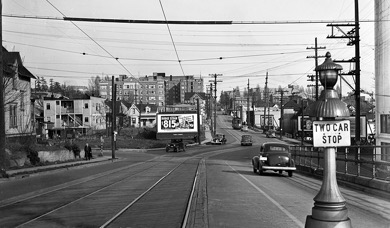Ghosties

"It still terrifies me today."
Some places seem permanently haunted. No subsequent contradictory experience ever erases the spookiness of these places. Once jarred, forever barred from comfortable coexistence. Seattle, or Sleazeattle, as I used to call it when I lived here, serves as that place for me. The prospect of revisiting it raised my hackles. The two days before we crossed the Cascades, I caught myself dreading our next destination, even though nearly fifty years now separate me from those times. It was always a cold city, one seemingly still struggling to outgrow its sorry start. The great fire of 1889 seemed to just encourage those who'd grown accustomed to walking its soggy board sidewalks. They built skyscrapers on unpromising fill and kept growing until it began to strangle itself with its own traffic. Hillsides held huge houses overlooking a smoky port. Slums subsumed its Southern third. It was every bit as segregated as Atlanta or Chicago or Boston. It was and remains a distinctly odd place.
Walking this morning through the Pike Place Market before opening time, I find it still just as unpromising as it ever seemed. A produce vendor insults me as I pass. That hasn't changed, either. The streets still seem greasy and unkempt, though post modern construction peeks out through still almost ramshackle older buildings. The Sound peeks through the few spaces separating tightly-built blocks. The hills, too, seem unchanged and just as daunting as they ever were. I pass Pine Street and find my mind transporting me back in time when Freddy, a grifter on release from a term in the Walla Walla State Pen, took me on a tour of his older haunts. Pine Street in 1973 personified Sleazeattle, with end to end bars and strip joints I would have never considered entering alone, but Freddy insisted. He wanted to show me something.
He escorted me into a full dress Tom Waits songbook, where Small Change really did get rained on with his own thirty-eight. Freddy pointed out that the bar across the street was the bank robbers' joint. "Everyone in there thinks they're Dillinger," he explained. Freddy seemed to know everyone on the street, shuffling shadows he claimed were all on parole or had been in the joint. "That one's the finest forger in the Northwest," he noted. Another place seemed to be a titty bar featuring tiny pasties for modesty's sake. Everyone Freddy introduced me to seemed bigger than life and also somewhat run over by it. They seemed a defiant crew, belligerently walking too close to a fine line I'd never once considered crossing. They seemed damned and also damned proud of their condition. Freddy eventually reverted to his old ways and was indicted for real estate fraud. The pull of the money was stronger than his attachment to his wife and kids. He went back over to Walla Walla.
I'd been down to the Pioneer Square casual labor office where I sat with sad hungover indians praying for a day's work for a half-day's pay. I'd wandered the reaches of the University District through long unpromising evenings, worrying out another song lyric, feeling far distant from myself. Sleazeattle was where I came of age, disconnected from my homeland and quite literally out on the street. It seemed then as it still seems now, the sort of place more likely to steal your wallet than provide a paycheck. The Muse and I last night, tuckered from our frantic entrance into this place, decided to just grab a quick bite from the hotel restaurant, though we knew it was a clip joint by the very look of the place. She ordered crab cakes that recalibrated my concept of micro-miniaturization. If you're not actively fleecing here, you're a sheep.
My most jarring experience here came when Jimmy Underhill, another recent parolee who we'd given a lift over to the area when he gained release, fell back on hard times. On the drive from the opposite side, he'd sworn again and again that he'd never go back to using again. Those first few weeks seemed promising. He sounded so damned upbeat, but he couldn't find a job or qualify for training. He moved out of his endlessly forgiving sister's place back out on the streets. He'd started using again. I learned that he'd shot himself from a small piece in the paper, a friend of mine worth a couple of lines on the fifteenth page of the Times. I came to understand that this place was more than semi-serious street theater. That it gobbled up good people as well as bad ones. It still terrifies me today.
©2019 by David A. Schmaltz - all rights reserved


